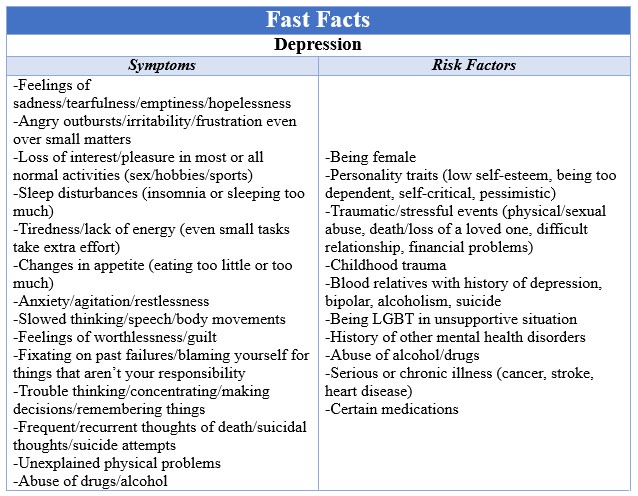Why don’t you care anymore?
Everyone feels unhappy at some point or another, but what happens when those feelings of sadness won’t go away? All of a sudden you are no longer interested in your normal activities. You have trouble doing day-to-day things. It can even feel like life isn’t worth living. Does any of this sound like you? If so, you might be depressed.
 Definition
Definition
Depression is a mood disorder that has persistent feelings of sadness and loss of interest in normal activities. It can not only effect how you think and feel but it can affect your behavior and lead to a variety of emotional and physical problems. It is not something that you can just snap out of and often needs treatment from healthcare professionals. The exact cause of depression is unknown but thought to be due to biological differences, brain chemistry, hormones, and inherited traits. It is thought that a combination of these are likely to play a role in a person developing depression.
Depression can present in a variety of ways. Some of the most common are feelings of sadness/hopelessness, angry outbursts, irritation over small matters, loss of interest in normal activities, sleep disturbances, lack of energy, changes in appetite, anxiety, slowed thinking/speech/body movements, feelings of worthlessness, trouble concentrating, unexplained physical problems, misusing alcohol/drugs, and thoughts of death/suicidal thoughts/suicide attempts. Please see Fast Facts for an in depth list of symptoms.
Depression is a disease that affects a large number of people from children to the elderly. There are several risk factors that put you at a higher risk for depression. Some of these are being female, having certain personality traits (low self-esteem, self-critical, being too dependent on others), experiencing traumatic/stressful event (abuse, death of a loved one, difficult relationship, financial problems), having blood relatives with a history of depression, serious/chronic illness, abusing drugs/alcohol, having a history of other mental health disorders, and certain medications.
Treatment
There are several different types of depression and it is important to understand which type you have in order to get the best treatment. You need to be tested, which often include a physical exam, blood work, and psychological evaluation. Part of the psychological evaluation will be a test called the DSM-5 (Diagnostic & Statistical Manual of Mental Disorders). It is published by the American Psychiatric Association to help provide the criteria for identify mental health issues. Some of the types of depression are anxious distress, mixed features, melancholic features, atypical features, psychotic features, catatonia, peripartum onset, and seasonal pattern. Other mental health disorders can cause depression to surface or become worse.
Treatments usually involve two steps: medication and psychological counseling. There are many different kinds of medications that treat depression. It is important to discuss with your doctor which type will work best for you. Sometimes this means trying a few different ones in order to find the most appropriate one. The key to remember with any of the medications is not to stop taking them suddenly as this can be very harmful to your health. Another possible side effect of medications is increased suicidal thoughts. The reason behind this is that as the medications start to become affective, people have the increased energy to carry out the plan that they may have formulated. This is why the psychological counseling is an important piece of treatment plan. If you are found to be a threat to yourself or others or can’t care for yourself, you might need hospitalization to get the help you need.
Prevention
The first key to prevention is to have an understanding of what depression is and how it affects you. Know what your warning signs are that signal an episode of depression is likely to occur and seek treatment as early as possible. Take steps to control stress in your life and find ways to relax. Once you have a treatment plan laid out by your doctor, make sure that you stick with it (if you have any concerns, talk to your doctor before making changes). Reach out to family/friends for comfort when you need it and join a support group in order to have access to further encouragement.
If you are having any symptoms of depression, please talk to your doctor. If you would like further information please visit the National Institute of Mental Health (NIMH) at https://www.nimh.nih.gov/health/topics/depression/index.shtml or National Alliance on Mental Illness (NAMI) at https://www.nami.org/Learn-More/Mental-Health-Conditions/Depression If you are feeling suicidal, please call 911 or the National Suicide Prevention Lifeline at 1-800-273-TALK (8255). Use the same number and press “1” for the Veterans Crisis Line. Remember you are not alone, many people are affected by depression and there is help available.